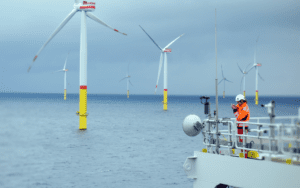In the first part of this series, key decision-makers from Vestas, Attentive Energy, RWE Renewables and Atlantic Shores share their real-world insight on their hiring strategies and scaling-up journeys. Comments have been edited and condensed for clarity.

Jeff Anderson, Chair
Let’s talk about your experiences of hiring in offshore wind right now. How have you grown so far, how can we future-proof the industry through things like education, and do you have any lessons learned?



Amy McGinty, VP Offshore Construction, Vestas
Our goal at Vestas is capturing the significant offshore wind experience and expertise that we already have within the organization – up until this point it has been mostly in Northern Europe – and bringing that expertise to the United States. And at the same time, pairing that expertise up with local hires, people here in the United States coming from a mix of very relevant backgrounds.
Onshore wind, oil and gas, maritime, military, large-scale construction projects, these are all industries that apply very well to offshore wind. The goal is that we bring a few key individuals that have this experience, bring them to the US, hire as much as we can locally, and pair them up. Because they perhaps don’t know how to operate here on a local level, and we need people who know how to build projects in the local community.
So we create these diverse, high-performing teams to safely and successfully execute these massive projects. And at the same time, transfer and build out knowledge locally – because at some point they’re going to go home, and we want to keep that knowledge here in the US.




Jeff Anderson
That European presence still has a critical role to play, particularly as we get closer to project execution. But you’re absolutely right, it’s so important that we build organizations that understand how to operate in the US, because it’s completely different from operating in Europe or Asia. How has Atlantic Shores been hiring, how have you brought people into the business and where have they come from?


Nathalie Jouanneau, JV Strategy & Portfolio Manager, Atlantic Shores
We’ve really focused more on US personnel so far and we’ve brought in a few key people. Particularly as we get closer to execution, we’re talking about it at the right time.
Because these projects are such a massive undertaking, we’ll need the expertise of people who have actually delivered them before. And they usually come from Europe, some from Asia. But at the phase we’re in currently, we can find that expertise in the US. We also really focus as much as we can on our two target markets, New Jersey and New York, because it’s very important that we have these communities represented within their projects.
Because we’re a joint venture, we can bring in talent from both Shell New Energies and other aspects of Shell, as well as EDF Renewables. So we have a mix now of people coming from onshore renewables with transferable skills – people from oil and gas who bring that offshore expertise, that expertise around permitting and risks. And we also have people from the utilities world, and some also from the Government side.
It’s also important for us to not bring in too many expatriates. That’s not just about the cost – it’s because we strongly believe that the expertise is here. It’s just about ramping up their skills and their knowledge within offshore wind, and sometimes pairing them with European knowledge.


Claudia Soltys, HR Business Partner, RWE Renewables
So for RWE it’s the transfer of knowledge. We have a 125-year old company. We can rely on that, we can reference it, we can leverage what our predecessors have learned, and avoid making the same mistakes.
We’re building from the top down at this point. The company has grown here in Boston within the last couple of years, and we’re using many of our European colleagues. At the same time, we’re also hiring in the US because we definitely have the talent here – it’s a matter of understanding and transferring those skillsets that our European colleagues have.


Damian Bednarz, Managing Director, Attentive Energy
The Attentive Energy origin story is unique. We learned much about the industry from being a small team representing a European utility, being integrated into a global energy major… it was important to effectively integrate our culture and value systems into a larger structure.
It’s a different scenario altogether from a joint venture because you’re becoming part of a larger company, and with that integration comes a new focus on recruitment, not only internally. We have technical expertise, in Paris, Houston and elsewhere in the team, and we’ve also thought through what else we need in the US, in terms of the more available resources of the workforce.
A key part of scaling a team is also retention – we want our team to know that there is a career pathway here. Retention policy is super-critical because we’re now heading into another phase, where there’s a lot of exchange of talent between organizations. How do we keep those team members that we need now, educate, nurture them and help them grow?




Jeff Anderson
Retention is something we’ll certainly come back to: it’s a key goal and a challenge for the international industry at the moment. What have been the other challenges you’ve faced when finding the right individuals? And what are the hardest skillsets to hire, how have you gone about recruiting them?



Amy McGinty
It’s a hot market right now: anyone with a minute of experience in offshore wind can go find a job. Our goal is not to just hire a hundred people all from the same organization, so we’ve really been trying to look outside of offshore wind. We’ve grown a lot and I’m really excited and proud of the team that we have built.
So I don’t want to say that there’s no challenges, it just comes down to hard work. But we’re doing it, and we’re finding good people and bringing them into the organization. We’d like people with offshore experience, but it cannot be a requirement. It’s not one of our requirements, and the majority of positions we’re filling. We’ve had to think hard about the skillsets we actually need, the industries that they could exist in, and then we go out and find it from outside of the industry.
Read part two, on retaining talent and nurturing corporate culture.
Read part three, on retaining culture in a new joint venture.
Read part four, on training strategies for new team members transitioning into offshore wind.
Read part five, on attracting the right talent.
Read part six, on salary and compensation.

